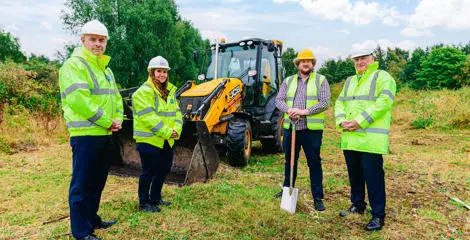Why quantum technology can be Scotland's next big economic driver
The following article, originally featured in The Herald's Business HQ on Thursday, 3 October 2024, is authored by Professor Gillian Murray, Deputy Principal for Business and Enterprise at Heriot-Watt University. Professor Murray examines the transformative potential of quantum technologies and highlights how Scotland’s academic strengths could redefine the future of business.

Few words make the ears prick up like “quantum”. From enhancing drug discovery and optimising supply chains through to analysing financial risk and creating uncrackable communications, quantum technology has the potential to touch almost every part of the economy - and Scotland has the opportunity to lead the way.
The world around us obeys the laws of classical physics, from apples falling from trees through to every action having an equal and opposite reaction. But at the scale of individual atoms, electrons, and photons, those classical laws start to break down and are replaced with the rules of quantum mechanics.
These rules can unlock extraordinary possibilities. For instance, quantum computers could solve complex problems far beyond the capabilities of today's most powerful supercomputers, while quantum communication could provide near-unbreakable security for data transmission. These aren't just theoretical concepts - they're technologies being developed right here in Scotland, with the potential to transform industries from healthcare to aerospace.
At the heart of Scotland's quantum revolution is the Integrated Quantum Networks (IQN) Hub; an exemplar of how universities are driving the future economy, creating new products and fostering emerging sectors, and led by Heriot-Watt University.
As a key component of the UK's £160 million investment in quantum technologies, the IQN Hub is not just a research project – it's a catalyst for economic growth and innovation. Our mission is to develop large-scale quantum networks, paving the way for a “quantum internet” that could revolutionise secure communications and distributed computing, while nurturing a new quantum technology cluster in Scotland.
By bridging this gap between cutting-edge research and real-world business applications, the IQN Hub is laying the groundwork for transformative technologies that could reshape how businesses operate across multiple sectors, putting universities at the heart of our economy.
In the financial sector, for instance, quantum computing could enhance risk assessment models, allowing banks to process vast amounts of financial data and consider a much wider range of variables than ever before. This could lead to more accurate predictions of market trends and more robust portfolio optimisation.
For transportation and logistics companies, quantum-enabled position, navigation, and timing systems could provide extremely precise location data even in areas where GPS signals are weak or unavailable. This could enable more efficient route planning, improved asset tracking, and enhanced safety across various modes of transportation.
Meanwhile, businesses that handle sensitive data - ranging from law firms to healthcare providers - could use quantum technology to construct secure networks, potentially neutralising the threat from cybercrime, which currently costs the UK a staggering £27 billion annually.
The global race to harness this powerful innovation is already intensifying. As of 2022, China's officially acknowledged public investment in quantum technology reached $15.3 billion, surpassing the combined total of the European Union, the United States, and Japan. The UK Government, recognising the immense potential, aims to invest £2.5 billion in quantum research and innovation over the next decade, with the goal of capturing a 15% share of the global quantum technologies market by 2033.
The economic stakes are high too. According to reports, quantum computing alone could deliver as much as $850 billion in benefits globally over the next 15 to 30 years. More immediately, Hyperion Research found that 21% of businesses plan to put quantum technology into production within the next 18 months – a 50% increase from two years ago.
For Scottish businesses, the quantum revolution isn't a distant future – it's happening right now. Forward-thinking leaders are already exploring how quantum technologies could give them a competitive edge and are identifying areas where quantum computing could solve complex challenges.
The quantum ecosystem in Scotland offers unique opportunities for companies to get ahead of the curve. At Heriot-Watt University, we're seeing increasing interest from businesses looking to collaborate on quantum applications tailored to their specific needs. These partnerships are proving mutually beneficial, accelerating both academic research and commercial innovation.
As with any emerging technology, early engagement can yield significant advantages. Companies that are proactively assessing the potential impact of quantum technologies on their operations are positioning themselves as industry leaders. Businesses also have a crucial role to play in shaping the regulatory landscape for quantum technologies, ensuring that standards and regulations support innovation and growth.
Heriot-Watt's own involvement in the quantum ecosystem extends beyond the IQN Hub and Scotland’s borders. We're engaged in three of the four other newly announced quantum hubs across the UK, covering areas such as quantum-enabled position, navigation and timing, quantum biomedical sensing, and quantum sensing, imaging and timing.
Scotland's growing importance in this field will be on full display at the upcoming Single Photon Workshop 2024, taking place from 18-22 November at the Edinburgh International Conference Centre. This prestigious event will bring together global experts in advanced photonics and quantum technology, offering Scottish businesses a unique platform to connect with international leaders, explore groundbreaking research, and spark future collaborations. It's a testament to Scotland's quantum expertise and an unparalleled opportunity for our businesses to engage with the quantum community right on their doorstep.
Scotland has the potential to become a global quantum hub, attracting international talent and investment. Laying firm foundations will be key to reaching that goal, which means companies and universities need to work together to create the tailored technology that will give the necessary edge. By taking proactive steps now, Scottish businesses can ensure they're not just ready for the quantum future – they're helping to shape it.
Let's seize this opportunity together and cement Scotland's position at the forefront of the global quantum revolution.
For ways to get involved in the upcoming Single Photon Workshop please visit the event website.
To find out more about collaboration with Heriot-Watt's leading expertise in quantum sciences and technology, get in touch with the universities Global Research Innovation Discovery (GRID) team via GRID@hw.ac.uk.
Contact
Scott Holmes
Related content
Heriot-Watt to lead UK's push for ‘near-unhackable’ quantum internet
Heriot-Watt University announces its leadership of a new quantum research hub that aims to develop the ultra-secure 'quantum internet' of the future.

Heriot-Watt University breaks ground on new £2.5M Optical Ground Station
Work has started on a new Quantum Communications Hub Optical Ground Station (HOGS), a state-of-the-art telescope which is being built on Heriot-Watt University’s Research Park.

Heriot-Watt and Renishaw industry collaboration is shortlisted for prestigious engineering award
A research collaboration between Heriot-Watt University and Renishaw, a global engineering technology group, has been shortlisted for a prestigious UK engineering award.

Heriot-Watt laser system will capture nature’s fastest processes
A scientist at Heriot-Watt University is to receive over £2million in European funding to fill in the blind spots of Nobel Prize-winning technology.

Heriot-Watt celebrates successful conclusion of inaugural DeepTech LaunchPad initiative
Completion of the first Heriot-Watt University DeepTech LaunchPad programme. The six-month accelerator supported entrepreneurs working in robotics, AI, and advanced engineering.
